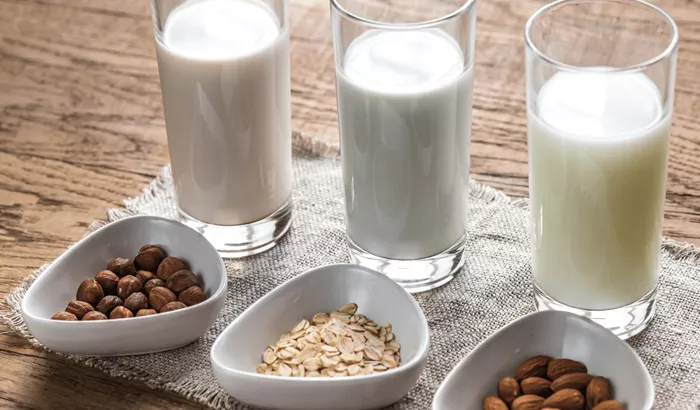When it comes to milk, the variety of choices can be overwhelming. Organic milk, however, often comes with a higher price tag, leading many to wonder if it’s truly worth the extra cost.
Studies show that milk can reduce the risk of several health conditions, including cardiovascular disease, hypertension, stroke, and osteoporosis. But while milk is nutritious, the benefits may vary depending on whether it’s organic or conventional.
What Is Organic Milk?
Organic milk is distinct from conventional milk in both its farming practices and nutritional content. To earn the organic label, milk must come from cows raised on certified organic farms. These farms follow strict guidelines, such as providing cows with 100% organic feed and access to outdoor pastures year-round. The use of antibiotics, synthetic growth hormones, or preservatives is prohibited in organic dairy farming.
Organic milk undergoes a similar processing method to conventional milk, with pasteurization and homogenization, but without any artificial additives. It is usually processed at ultra-high temperatures, which extends its shelf life compared to regular milk, which is heated at lower temperatures for a longer period.
Benefits of Organic Milk
Organic milk has several potential health benefits. Its unique farming practices contribute to a distinctive nutrient profile and taste.
Fatty Acids and Nutritional Profile
Organic milk from pasture-raised cows tends to have a more favorable fatty acid composition. These cows eat fresh grass, which results in milk richer in omega-3 and omega-6 fatty acids, as well as conjugated linoleic acid (CLA). These fatty acids are essential for cellular health, immune function, and inflammation reduction. CLA, in particular, may also help fight cancer and support weight management.
Lower Chemical Residues
Organic milk is produced without the use of antibiotics or synthetic hormones, which are commonly found in conventional dairy products. Studies suggest that pesticides, which are more commonly used in conventional farming, may increase the risk of certain cancers and harm the brain. For those concerned about chemical exposure, organic milk provides a cleaner option.
Antioxidants and Vitamins
Organic milk contains higher levels of antioxidants like vitamin E and beta-carotene, which help combat oxidative stress and inflammation. These antioxidants come from the cows’ diet of fresh herbs and grasses. Including organic milk in your diet may help support overall health and protect against chronic diseases.
Environmental Impact
Though not a direct health benefit, organic farming practices are often better for the environment. Organic dairy farming is linked to improved sustainability and reduced pollution. It is also seen as a more humane approach to animal welfare, as cows have access to pastures year-round.
Nutritional Facts
A typical serving of organic whole milk (1 cup or 240 ml) provides:
- Calories: 161
- Protein: 8 grams
- Fat: 9 grams
- Carbohydrates: 12 grams
- Calcium: 199 mg (20% of the Daily Value)
- Potassium: 281 mg (8% of the Daily Value)
- Vitamin A: 72 mcg (8% of the Daily Value)
The nutrient profile of organic milk is richer than conventional milk, thanks to the cows’ diet. Organic milk typically contains more beneficial fatty acids and antioxidants, making it a potentially healthier choice.
Risks of Drinking Organic Milk
Although organic milk is generally safe, there are a few concerns. Some studies link milk consumption to a slightly higher risk of prostate cancer, acne, and iron-deficiency anemia. Milk can also cause allergic reactions or flare-ups of lactose intolerance in some individuals.
Organic milk, like conventional milk, is rich in omega-6 fatty acids, and excessive intake may contribute to inflammation. However, these health risks are minimal, especially when compared to the potential harm from growth hormones and pesticides used in non-organic milk.
Other Considerations
When deciding between organic and non-organic milk, it’s important to weigh factors such as cost, shelf life, and the ethical treatment of animals. Organic milk is more expensive due to its higher production costs. However, its richer nutrient profile and longer shelf life might make it worth the investment for some consumers.
Organic dairy farming also supports animal welfare, as cows are allowed to roam and graze in pastures year-round. Additionally, organic farming practices leave a smaller environmental footprint compared to conventional methods.
Should You Choose Organic Milk?
Choosing between organic and conventional milk is a personal decision. Organic milk offers some benefits that regular milk doesn’t, such as fewer pesticides, no synthetic hormones, and a more favorable nutrient profile. However, it comes with a higher price tag.
While conventional milk is more affordable, it still provides essential nutrients like calcium, protein, and vitamins. If you’re willing to pay extra for organic milk’s health and environmental benefits, it could be a good addition to your diet. However, non-organic milk remains a solid choice for those on a budget.
Quick Takeaway
Organic milk contains more nutrients, including omega-3s and antioxidants, than conventional milk. However, it is pricier and may not be accessible to everyone. Both types of milk offer valuable nutrients, but organic milk may be the better choice for those concerned about chemicals and sustainability.
Read more:
- Study Reveals Drinking Milk Daily Could Cut Bowel Cancer Risk By 17%
- Cheese Up, Milk Down: The Impact Of Changing Dairy Habits On Our Health
- Navigating Dairy Choices: The Case Against Raw Milk For Kids


